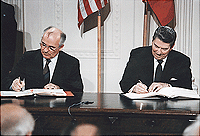Gorbachev's quest for historical justice By Nikolai Troitsky | RIA-Novosti | Aug. 17, 2010 | JRL 2010-155-1 - JRL Home
 Twenty years ago, on August 13, 1990, Mikhail Gorbachev, the first and only president of the Soviet Union, signed a decree exonerating all the victims of Stalin's repressions.
Twenty years ago, on August 13, 1990, Mikhail Gorbachev, the first and only president of the Soviet Union, signed a decree exonerating all the victims of Stalin's repressions.
The move was largely symbolic - an attempt by Gorbachev to restore his reputation among the intelligentsia, his political base during the early days of perestroika, whose faith in Gorbachev had declined dramatically by the summer of 1990.
In the Soviet Union of the 1980s, former political prisoners were not pariahs. They enjoyed the same rights as any other Soviet citizen. Gorbachev's decree was not so much about restoring the rights of citizenship, but rather providing material compensation for past suffering.
But before they could actually receive these compensations and social benefits, former political prisoners and their families had to wait for a series of laws to be enacted to translate the presidential decree into reality. As they waited, the Soviet Union and its economy collapsed around them. Economic shock therapy saw to it that once the relevant laws were finally passed, the actual compensation received was itself little more than a symbolic gesture.
But the rehabilitation of former political prisoners was not an issue that could be measured in rubles and kopecks. More significant was the fact that Gorbachev, as the head of the Soviet state and the ruling Communist Party, recognized the injustices committed by his party and predecessors, particularly Joseph Stalin, whose dictatorial regime was propped up by mass terror, arrests and executions.
Gorbachev was not the first Soviet leader to try to clear the names of falsely convicted political prisoners. Nikita Khrushchev first began the process after coming to power in 1953. Unlike Gorbachev, Khrushchev himself played a role in Stalin's crimes, and the steps he took in power to exonerate Stalin's victims may also have been an attempt to atone for his own sins.
Gorbachev's decree explicitly references Khrushchev's failed attempt at exoneration: "Proclaimed at the 20th Congress of the CPSU [in 1956], [the policy of] repairing injustices was not pursued consistently and essentially came to an end in the second half of the 1960s."
Both Khrushchev's and Gorbachev's initiatives can be quantified. According to official records, 737,182 former political prisoners were exonerated in the period between 1954 and 1961. Between 1988 and 1989, 856,582 political cases were reviewed and 844,740 people were exonerated.
These numbers probably do not reflect the total number of falsely accused political prisoners. Statistics from Stalin's reign are not a solid enough foundation for redressing historical wrongs. But even the official number accepted by the Soviet leadership -- 1,581,992 innocent victims -- is chilling, and talk about the "exaggerated" number of Stalin's victims becomes indecent in its shadow.
By any measure, Gorbachev's decree was a momentous step in the effort to redress the injustices of the Soviet past.
"Acts of repression against peasants during collectivization and others during the 1920s-1950s for social, ethnic, religious or other reasons, are hereby declared unlawful and in violation of fundamental civil and socio-economic rights, " reads the decree's opening passage. "The rights of these citizens are hereby fully restored. "
The August 13, 1990 decree did little to regain the support of Gorbachev's perestroika pioneers, who were already gravitating toward his main challenger, Boris Yeltsin, then Chairman of the RSFSR Supreme Soviet. And compensation payments to the victims began in earnest only in 1992, after the necessary laws were finally passed by parliament. The Presidential Commission for Rehabilitation of Victims of Political Repression was set up to oversee the process, led by Alexander Yakovlev, a former Secretary of the CPSU Central Committee and close ally of Gorbachev.
Yakovlev collaborated with Gorbachev on the text of the decree, and he deserves the credit for seeing the effort to exonerate all victims through to the very end.
As for Gorbachev, he deserves our recognition and respect for his noble act he succeeded to effect, which made it impossible for future governments to deny the crimes committed by the Soviet regime.

